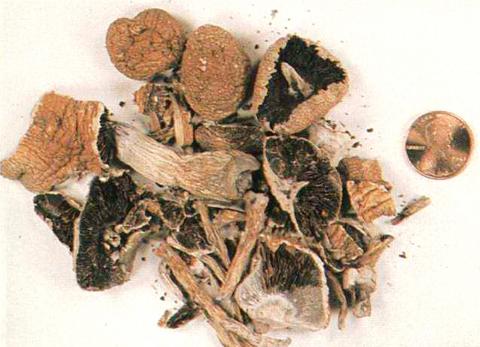Authorities have issued a warning after “magic mushrooms” were found growing at a popular pasture in Yangmingshan National Park (陽明山), saying the fungi are classified as a “Category 2” illegal drug.
Taipei’s Seventh Special Police Corps (保七總隊), in charge of public safety at Yangmingshan park, said they were alarmed at the discovery of “magic mushrooms” and have beefed up patrols in the park, which is frequented daily by city residents, hikers and tourists.
“We are paying close attention to this case and a team was dispatched this morning to collect the mushrooms. They will be sent for lab analysis,” said Wang Chi-cheng (王志成), head of the criminal investigation unit at the Seventh Special Police Corps.

Photo provided by the Criminal Investigation Bureau
“Before making a proper identification, we have reinforced patrols throughout all areas of Yangmingshan,” Wang told reporters.
The beefed-up patrols are needed because authorities have become aware of reports of the mushrooms creating a buzz both online and off the Web, mostly due to unfamiliarity and curiosity about this particular wild fungus with hallucinatory and psychedelic properties, Wang said.
According to a Chinese-language Apple Daily report on Monday, a man from Taipei surnamed Huang (黃) last month went to park’s Qingtiangang (擎天崗), a scenic mountain pasture still used by local farmers to graze cattle.
Huang said he found wild mushrooms, mostly white in color, growing on the cow dung. Thinking they were edible, the 24-year-old picked a bunch and took them home. He made a vegetable stir-fry with the mushrooms and consumed the dish.
Huang recalled that he began to experience something unusual.
“I felt light, like my body was floating in midair. I saw strange things and space seemed distorted. I also had this uncontrollable drooling,” he said, according to the newspaper report.
After coming down from the hallucinatory trip, which lasted about two hours, Huang was frightened and told a friend about the experience, who was certain Huang had eaten “magic mushrooms.”
According to experts, Huang had eaten psilocybin mushrooms, which contain the active ingredients psilocybin and psilocin.
Chen Chi-chen (陳啟禎), a biology professor at Southern Taiwan University of Science and Technology, said some indigenous people of central America used psilocybin mushrooms to induce psychedelic experiences during traditional ceremonies and religious rituals.
“In this case, the mushroom spores were eaten by cattle and expelled in their feces. When suitable temperature and humidity conditions were met, they sprouted on the dung and grew into mature mushrooms,” Chen said.
“They can also grow on other cool and wet mountain slopes around Taiwan, not just on Yangmingshan,” he added.
On Tuesday, the Food and Drug Administration issued a statement warning the public not to pick any wild mushrooms found in mountainous areas and not to eat them.
“Psilocybin mushrooms affect the central nervous system, lead to muscle weakness, and may cause convulsions and lead to death in serious cases,” the administration said.
The statement stressed that psilocybin mushrooms are illegal in Taiwan, as they are considered a “Category 2” drug, alongside marijuana and amphetamine.

The brilliant blue waters, thick foliage and bucolic atmosphere on this seemingly idyllic archipelago deep in the Pacific Ocean belie the key role it now plays in a titanic geopolitical struggle. Palau is again on the front line as China, and the US and its allies prepare their forces in an intensifying contest for control over the Asia-Pacific region. The democratic nation of just 17,000 people hosts US-controlled airstrips and soon-to-be-completed radar installations that the US military describes as “critical” to monitoring vast swathes of water and airspace. It is also a key piece of the second island chain, a string of

A magnitude 5.9 earthquake that struck about 33km off the coast of Hualien City was the "main shock" in a series of quakes in the area, with aftershocks expected over the next three days, the Central Weather Administration (CWA) said yesterday. Prior to the magnitude 5.9 quake shaking most of Taiwan at 6:53pm yesterday, six other earthquakes stronger than a magnitude of 4, starting with a magnitude 5.5 quake at 6:09pm, occurred in the area. CWA Seismological Center Director Wu Chien-fu (吳健富) confirmed that the quakes were all part of the same series and that the magnitude 5.5 temblor was

Taiwan will now have four additional national holidays after the Legislative Yuan passed an amendment today, which also made Labor Day a national holiday for all sectors. The Chinese Nationalist Party (KMT) and Taiwan People’s Party (TPP) used their majority in the Legislative Yuan to pass the amendment to the Act on Implementing Memorial Days and State Holidays (紀念日及節日實施辦法), which the parties jointly proposed, in its third and final reading today. The legislature passed the bill to amend the act, which is currently enforced administratively, raising it to the legal level. The new legislation recognizes Confucius’ birthday on Sept. 28, the

The Central Weather Administration has issued a heat alert for southeastern Taiwan, warning of temperatures as high as 36°C today, while alerting some coastal areas of strong winds later in the day. Kaohsiung’s Neimen District (內門) and Pingtung County’s Neipu Township (內埔) are under an orange heat alert, which warns of temperatures as high as 36°C for three consecutive days, the CWA said, citing southwest winds. The heat would also extend to Tainan’s Nansi (楠西) and Yujing (玉井) districts, as well as Pingtung’s Gaoshu (高樹), Yanpu (鹽埔) and Majia (瑪家) townships, it said, forecasting highs of up to 36°C in those areas